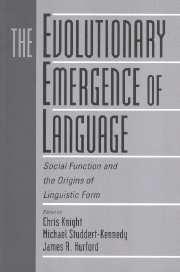Book contents
- Frontmatter
- Contents
- Contributors
- Acknowledgements
- Language: A Darwinian Adaptation?
- Part I The Evolution of Cooperative Communication
- 1 Introduction: The Evolution of Cooperative Communication
- 2 Comprehension, Production and Conventionalisation in the Origins of Language
- 3 Cooperation, Competition and the Evolution of Prelinguistic Communication
- 4 Language and Hominid Politics
- 5 Secret Language Use at Female Initiation: Bounding Gossiping Communities
- 6 Play as Precursor of Phonology and Syntax
- Part II The Emergence of Phonetic Structure
- Part III The Emergence of Syntax
- Epilogue
- Author Index
- Subject Index
3 - Cooperation, Competition and the Evolution of Prelinguistic Communication
Published online by Cambridge University Press: 24 November 2009
- Frontmatter
- Contents
- Contributors
- Acknowledgements
- Language: A Darwinian Adaptation?
- Part I The Evolution of Cooperative Communication
- 1 Introduction: The Evolution of Cooperative Communication
- 2 Comprehension, Production and Conventionalisation in the Origins of Language
- 3 Cooperation, Competition and the Evolution of Prelinguistic Communication
- 4 Language and Hominid Politics
- 5 Secret Language Use at Female Initiation: Bounding Gossiping Communities
- 6 Play as Precursor of Phonology and Syntax
- Part II The Emergence of Phonetic Structure
- Part III The Emergence of Syntax
- Epilogue
- Author Index
- Subject Index
Summary
Language Origins and Darwinian Thought
Theories of the origin of language are necessarily speculative. Calvin (1983) suggests that the development of language involved a transfer of the skills involved in stone throwing; Knight (1998) puts the roots of language in ritual; Bickerton (1998) argues that language arose from protolanguage in a single catastrophic mutation. Any one of these accounts might be true, but it is difficult or impossible to gather direct evidence that would allow us to decide between them. An unkind observer might conclude that anything goes, and that one foundation myth is as good as another.
However, such cynicism would be misplaced. In recent years the range of acceptable speculation has been greatly narrowed by the recognition that any account of language origins must be consistent with the principles of evolution by natural selection. For instance, modern Darwinism tells us that complex traits do not evolve without having some function, that all of the intermediate stages in the evolution of modern linguistic capacity must themselves have had adaptive value and that gradual development is more plausible than catastrophic change. These sorts of constraints immediately rule out many stories of language origin, such as the suggestion by Gould (1987) that language is a mere by-product of having a large and complex brain.
The chief problem for a Darwinian account of human speech, however, is the apparent level of altruism involved.
- Type
- Chapter
- Information
- The Evolutionary Emergence of LanguageSocial Function and the Origins of Linguistic Form, pp. 40 - 61Publisher: Cambridge University PressPrint publication year: 2000
- 13
- Cited by

